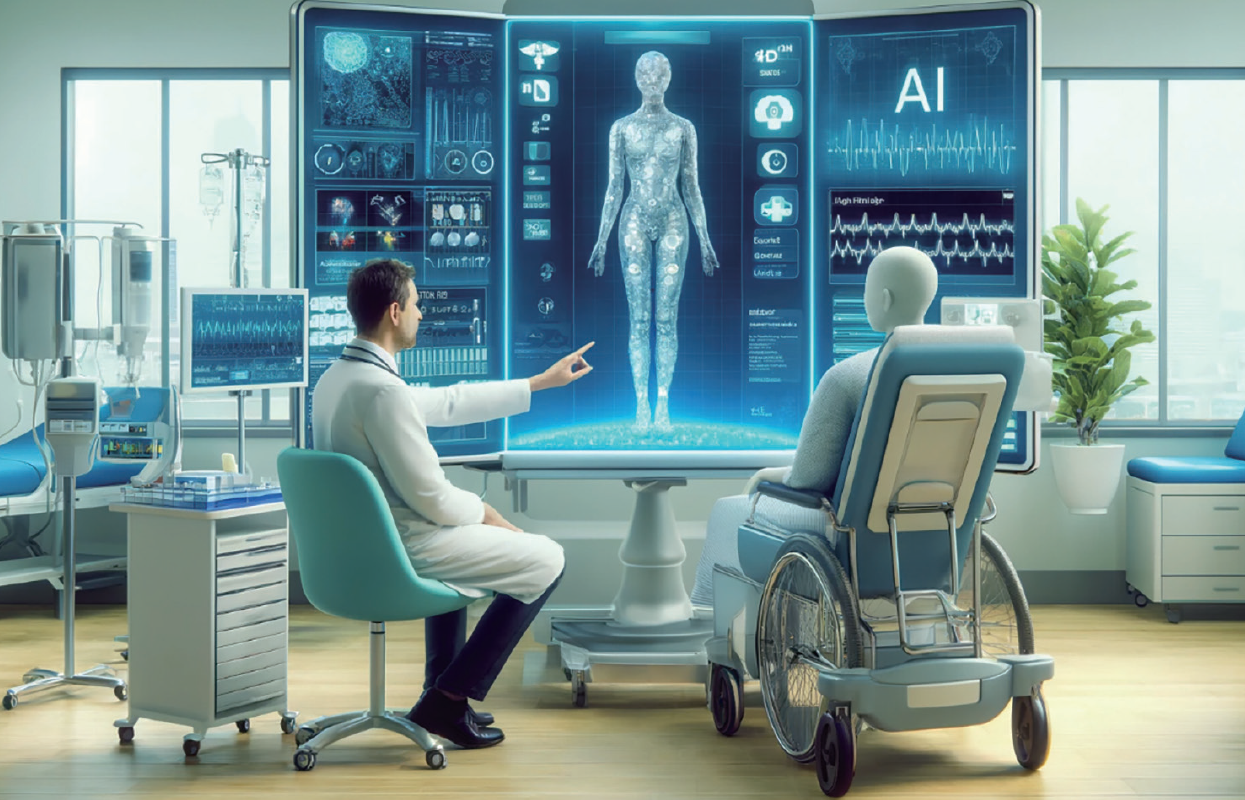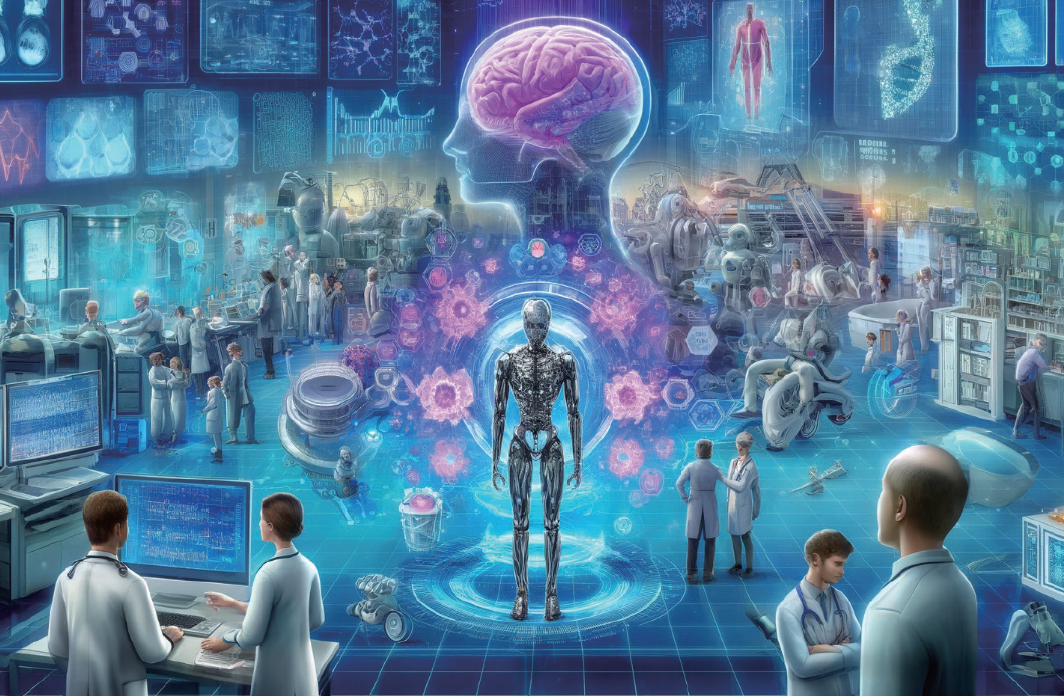As the conflict between the government and doctor groups, which began with the expansion of medical school admissions, continues, interest in digital treatment and medical artificial intelligence (AI) is also increasing. In particular, the need for non-face-to-face treatment has emerged during the COVID-19 pandemic, but it has been met with strong opposition from doctors.
The basis for opposition to non-face-to-face treatment was patient safety. If an AI that is not firmly established makes an incorrect diagnosis, it could pose a greater risk to the patient. However, as the resident strike continued, in February 2024, the government decided to raise the health care disaster alert to the highest level of 'serious' and fully expand non-face-to-face treatment. Is AI treatment and medicine really as unreliable as doctors fear?
AI that passed the medical licensing exam with flying colors can determine dementia just by listening to what you say
Overseas perspectives on medical AI are expectations rather than concerns, and it is predicted that it will bring much more efficient work and greater economic value. According to the British current affairs weekly 'The Economist', if medical AI is deployed globally, $200 to $300 billion out of the total annual medical expenses of $4.5 trillion (about 6,219 trillion won, or about 17% of GDP) will be saved in the United States alone. There was also a prediction that it could be done. In addition, it is predicted that there will be a shortage of nearly 10 million medical personnel worldwide by 2030, and statistics have been compiled that approximately 800,000 Americans are already experiencing misdiagnosis every year. The media reported that AI may be the solution to this problem. I wrote that this could be possible.
 |
| Future medical care diagnosed by AI. Illustration created by ChatGPT |
In particular, a technology that is attracting attention in the healthcare sector is generative AI. According to global consulting firm Deloitte, 75% of leading healthcare companies are already introducing generative AI to create healthcare innovations. For example, if a patient's biometric data is entered into the AI, the AI can analyze it and provide a customized diagnosis. Customer data from hospitals and insurance companies can also be quickly collected and processed if generative AI is used. In a survey of 121 CEOs, more than 90% predicted that generative AI will have a positive impact on healthcare companies this year.
There are evaluations that actual medical treatment through AI is already similar to or exceeds the level of general specialists. As a representative example, OpenAI's ChatGPT passed the medical licensing exam in the United States and Japan. In January 2023, ChatGPT passed the United States Medical Licensing Examination (USMLE) with a correct answer rate of 52.4 to 75.0% in three subjects, including biochemistry, diagnostic reasoning, and bioethics. Additionally, ChatGPT selected patients with early-stage Alzheimer's disease with an accuracy of 80% based on speaking patterns alone.
According to Professor John Ayers' team at the Qualcomm Research Institute at the University of California (UCSD), research results were announced in May 2023 showing that ChatGPT is superior in both the quality of diagnosis and empathy between doctors and ChatGPT. The researchers had experts compare and evaluate the answers they came up with to randomly selected questions in the same field of internal medicine, but blinded them so that they could not tell which was the doctor's answer and which was ChatGPT's answer. As a result, 79% of expert evaluations evaluated ChatGPT's diagnosis as superior to that of doctors.
In actual medical settings, AI is active in a variety of fields, such as reading medical images and combining algorithms with medical devices to notify doctors of patient abnormalities in real time. In particular, progress in the analysis of imaging results is notable. AI analyzes X-rays, MRIs, CTs, ultrasound images, and endoscopic images or images and analyzes whether the user has developed a disease. However, in the field, AI is only an auxiliary means, and it is still difficult to completely replace doctors. This is because AI discrimination and accuracy differ greatly for each disease. For example, the accuracy of the early stage breast cancer screening rate is close to 90%, but the accuracy of pneumothorax reading is only 60%.
 |
| Future medical care diagnosed by AI. Illustration created by ChatGPT |
New drug development, which takes 10 years, is speeding up thanks to AI. “Still, there are many obstacles to overcome.”
AI is also being actively used in the pharmaceutical field. In particular, when developing new drugs, it has been possible to improve accuracy and predictability and increase speed in the new drug development process through AI data mining and target molecular structure analysis. Representatively, overseas, Microsoft (MS) and Novartis have completed the development of personalized macular degeneration treatments, cell and gene treatments, and have signed a partnership to use AI for drug design. In Korea, pharmaceutical companies such as Dong-A Pharmaceutical and Hanmi Pharmaceutical have signed business agreements with AI technology companies one after another.
Demis Hassabis, CEO of Google DeepMind, known as the father of AlphaGo, also emphasized the scalability of AI in the pharmaceutical field. CEO Hassabis said at this year's Mobile World Congress (MWC 2024), "As artificial general intelligence (AGI) has been confirmed to be much more powerful and highly scalable than imagined, it is expected that AI-designed drugs will be available in hospitals within 2 to 3 years." “AI can shorten the average 10 years it takes to develop a new drug to just a few months,” he said. AGI refers to implementing human-like or greater intelligence through computers.
However, there are still many barriers to overcome in order to introduce new technologies in medical services. In particular, the fields of medicine, pharmaceuticals, and biotechnology are directly related to human life and safety, so errors or mistakes in AI that have not yet been revealed can result in fatal consequences for humans. Among the many obstacles to AI healthcare, the most representative one is medical big data. The accuracy of AI answers increases as much data is input as possible. However, because medical data is patients' personal information, it is fragmented and subject to strict regulation in most countries.
Robert Schmerling, professor of medicine at Harvard University, wrote in an article published in Harvard Health Publishing on March 27 (local time), “It is premature for patients to rely on AI answers without clear verification of accuracy and supervision by medical experts,” and “UCSD.” Qualcomm Research Institute's research results also do not discuss actual accuracy. “Even when asked directly on Chat GPT, he answered that the doctor was better (than his own diagnosis),” he pointed out.
There are also concerns that major problems could occur if the data input to AI is incorrect. Even if AI is highly developed and can make as accurate a diagnosis as a doctor, if there is a problem with the input data, it will produce incorrect results and the resulting damage will be passed on to the patient.
The Economist also cited cost reduction issues that will arise with the introduction of AI and government regulatory authorities that cannot keep up with innovation as obstacles. The current medical system is focused on improving services, but introducing AI may increase cost and complexity. However, 'The Economist' evaluated that despite these obstacles, there is a clear need to overcome them because there are vast benefits to be gained from using AI.
No comments:
Post a Comment